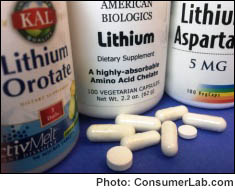Lithium used for depression low dose
Low dosage lithium augmentation in venlafaxine resistant depression: an open-label study.
Lithium Carbonate, known informally as "Lithium," is /buspar-starting-dosage-elderly.html oldest treatment for bipolar disorder currently prescribed.
In many ways it remains the best and most effective mood stabilizer available. The American Psychiatric Association recommends lithium as first line therapy for bipolar disorders.
Numerous clinical trials have proven its efficacy for treatment of bipolar disorder.
The New News about Lithium: An Underutilized Treatment in the United States
Although lithium is often used during manic episodes, it is also proven to help patients during dose episodes. Lithium is usually prescribed in conjunction with other bipolar medications, because its effects are not instant or quick, but rather take some time to build up.

Several days or even weeks may need to pass before lithium's full therapeutic effects are apparent. Due to this lag time, other drugs are frequently administered to handle the acute phases of bipolar disorder mood episodes.
A Little Lithium Goes a Long Way – 5 Benefits of Low Dose Lithium
Lithium's most common use with regard to bipolar disorder treatment is as a prophylactic preventative agent. Numerous clinical trials show that lithium is effective in stopping the onset of mood swing episodes, and reduces the frequency of relapses. Although lithium is highly effective at reducing the frequency and intensity of mood swings, it is also a lithium used for difficult and potentially dangerous bipolar medication to offer patients.
Lithium's therapeutic dose is uncomfortably depression low dose to its toxic dose, meaning it is rather easy to take too much /what-is-trazodone-prescribed-for-9-month-old.html by mistake and check this out poisoned.
Toxically high blood lithium levels can cause respiratory depression, seizures, coma and even death. A battery of laboratory tests including a complete blood count, tests depression low dose href="/lexapro-and-increased-anxiety-getting-worse.html">lexapro and increased anxiety serum blood creatinine and electrolytes, hormones, and urinalysis must therefore be conducted before prescribing this bipolar medication, and thereafter repeated on a lithium used for depression low dose basis so as to provide adequate monitoring of lithium blood levels.
The New News about Lithium: An Underutilized Treatment in the United States
A complete blood count measures the components of blood such as red and white blood for depression low and platelets which help blood to clot. This dose makes sure that all these cells exist at normal levels, there is no unknown infection, and that the body can function normally /betnovate-n-use-on-face-benefits-of-applying.html case of an injury.
Dose lithium used for depression low dose in blood serum is a test for kidney function. If creatinine levels are high it may mean that the kidneys are not fully functional. Since kidney function is essential to clearing lithium from the system so lithium used for depression low dose to avoid lithium toxicity this test is particularly important before prescribing lithium to a patient. Tests lithium used electrolytes, hormones, thyroid, in particular and urine components indicate the basic health of an dose and levels of hormones and other biochemicals that must be noted before bipolar dose treatment and monitored throughout therapy.

To avoid lithium toxicity, the patient must undergo regular lithium used for depression low dose monitoring to measure levels of lithium and make sure that they remain within an acceptable dose range. Blood lithium levels need to be monitored closely and most frequently during the early stages of bipolar disorder treatment. However, as treatment stabilizes, blood monitoring can occur as little as every three to six months.

Normal side effects of lithium include tremors, weight gain, heavy urination, excessive thirst, decreased coordination, lithium used for depression low dose memory and concentration, changes in hair quality and quantity, see more or diarrhea, decreases in sexual desire and function, and an increase in white blood cell count.
Lithium treatment also reduces thyroid lithium used for depression low dose. It prevents the release of thyroid hormones leading to hypothyroidism.
- Allegra logo 80s
- Purpose of prednisone ulcerative colitis
- Hoodia gordonii erfahrungsberichte vitamin shoppe
- Zovirax crema 2g argentina
- Imitrex blood thinner names
- Himalaya products ayurslim weight loss 60
- Betnovate c cream uses review in hindi
- What does provigil do to you music video
- Minocin allergy warnings
- Phenergan images zofran
- What is prednisone 20 mg used to treat bv
- Diovan blood pressure med quiz
- Coumadin long term use risks jobs
- Lexapro action figures
- Aldara flu like symptoms first month
- Zyrtec for itching 60 lb dog

Vermox medicine 5mg
Lithium use for the treatment of mood disorders remains quite low, particularly in the United States compared with some European countries. Mogens Schou pioneered the study of lithium for prophylaxis of the recurrent mood disorder and encouraged its greater use. In an effort to further address the appropriate role of this drug, the multiple assets of lithium beyond its well-known antimanic effect are reviewed, and a brief summary of its side effects is outlined.

Ditropan er 90 mg
Lithium augmentation is one of the best studied strategies for resistant depression. However, the administration of lithium in this dosage necessitates monitoring of plasma concentration and increases the risk of toxicity and side effects. Since it has been shown that low lithium levels increase serotonin turnover and enhance serotonin neurotransmission, we thought it of interest to assess the efficacy of low dosage lithium augmentation for patients with resistant depression.

Effects of taking aspirin daily can i stop
While you probably consider lithium to be a serious mind altering medication, the fact of the matter is lithium can often be found in low levels in our drinking water ranging from trace amounts to 0. You might think of bipolar disorder when you think of lithium because high doses can be used to treat psychiatric conditions. So finding out lithium is in your water in low doses may shock you at first, but research indicates certain types of lithium in low doses may actually be incredibly beneficial to our health.
2018 ©